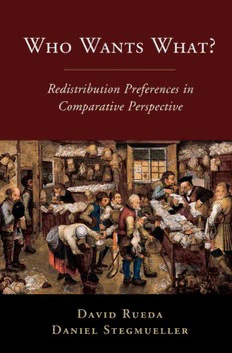
Who Wants What?: Redistribution Preferences In Comparative Perspective PDF
Preview Who Wants What?: Redistribution Preferences In Comparative Perspective
WhoWantsWhat? Why do some people support redistributive policies such as a gen- erous welfare state, social policy, or protections for the poor, and othersdonot?The(oftenimplicit)modelbehindmuchofcomparative politics and political economy starts with redistribution preferences. These affect how individuals behave politically, and their behavior in turn affects the strategies of political parties and the policies of governments.This book challenges some influential interpretations of thepoliticalconsequencesofinequality.RuedaandStegmuellerprovide anovelexplanationofhowthedemandforredistributionistheresult of expected future income, the negative externalities of inequality, and the relationship between altruism and population heterogeneity. This innovative and timely volume will be of great interest to readers interestedinthepoliticalcausesandconsequencesofinequality. David Rueda is Professor of Comparative Politics at the Department ofPoliticsandIRandProfessorialFellowatNuffieldCollege,Oxford University.HeistheauthorofSocialDemocracyInsideOut(2007)and has received numerous research awards, including a British Academy Research Development Award (2008–2010). He has held visiting positions at the Centre d’Études Européennes (Sciences Po, Paris), YaleUniversity,PrincetonUniversity,andStanfordUniversity. DanielStegmuellerisanassociateprofessorintheDepartmentofPolit- icalScienceatDukeUniversity.HeisalsoaFellowatNuffieldCollege, OxfordUniversity.HisresearchhasappearedintheAnnualReviewof Political Science,American Journal of Political Science,the Journal of Politics,PoliticalAnalysis,PublicOpinionQuarterly,andtheQuarterly JournalofPoliticalScience. CambridgeStudiesinComparativePolitics GeneralEditors KathleenThelen MassachusettsInstituteofTechnology ErikWibbels DukeUniversity AssociateEditors CatherineBoone LondonSchoolofEconomics ThadDunning UniversityofCalifornia,Berkeley AnnaGrzymala-Busse StanfordUniversity TorbenIversen HarvardUniversity StathisKalyvas YaleUniversity MargaretLevi StanfordUniversity HelenMilner PrincetonUniversity FrancesRosenbluth YaleUniversity SusanStokes YaleUniversity TariqThachil VanderbiltUniversity SeriesFounder PeterLange DukeUniversity OtherBooksintheSeries ChristopherAdolph,Bankers,Bureaucrats,andCentralBankPolitics:TheMythof Neutrality MichaelAlbertus,AutocracyandRedistribution:ThePoliticsofLandReform SantiagoAnria,WhenMovementsBecomeParties:TheBolivianMASin ComparativePerspective BenW.Ansell,FromtheBallottotheBlackboard:TheRedistributivePolitical EconomyofEducation BenW.AnsellandDavidJ.Samuels,InequalityandDemocratization:An Elite-CompetitionApproach AnaArjona,Rebelocracy:SocialOrderintheColombianCivilWar LeonardoR.Arriola,Multi-EthnicCoalitionsinAfrica:BusinessFinancingof OppositionElectionCampaigns DavidAusten-Smith,JeffryA.Frieden,MiriamA.Golden,KarlOveMoene,and AdamPrzeworski,eds.,SelectedWorksofMichaelWallerstein:ThePolitical EconomyofInequality,Unions,andSocialDemocracy S.ErdemAytaçandSusanC.StokesWhyBother?RethinkingParticipationin ElectionsandProtests AndyBaker,TheMarketandtheMassesinLatinAmerica:PolicyReformand ConsumptioninLiberalizingEconomies LaiaBalcells,RivalryandRevenge:ThePoliticsofViolenceduringCivilWar LisaBaldez,WhyWomenProtest?Women’sMovementsinChile KateBaldwin,TheParadoxofTraditionalChiefsinDemocraticAfrica (continuedafterIndex) Who Wants What? Redistribution Preferences in Comparative Perspective DAVID RUEDA UniversityofOxford DANIEL STEGMUELLER DukeUniversity UniversityPrintingHouse,Cambridgecb28bs,UnitedKingdom OneLibertyPlaza,20thFloor,NewYork,ny10006,USA 477WilliamstownRoad,PortMelbourne,vic3207,Australia 314–321,3rdFloor,Plot3,SplendorForum,JasolaDistrictCentre, NewDelhi–110025,India 79AnsonRoad,#06–04/06,Singapore079906 CambridgeUniversityPressispartoftheUniversityofCambridge. ItfurtherstheUniversity’smissionbydisseminatingknowledgeinthepursuitof education,learning,andresearchatthehighestinternationallevelsofexcellence. www.cambridge.org Informationonthistitle:www.cambridge.org/9781108484626 doi:10.1017/9781108681339 ©DavidRuedaandDanielStegmueller2019 Thispublicationisincopyright.Subjecttostatutoryexception andtotheprovisionsofrelevantcollectivelicensingagreements, noreproductionofanypartmaytakeplacewithoutthewritten permissionofCambridgeUniversityPress. Firstpublished2019 PrintedandboundinGreatBritainbyClaysLtd,ElcografS.p.A. AcataloguerecordforthispublicationisavailablefromtheBritishLibrary. LibraryofCongressCataloging-in-PublicationData names:Rueda,David,author.|Stegmueller,Daniel,1981–author. title:Whowantswhat?:redistributionpreferencesincomparative perspective/DavidRueda,DanielStegmueller. description:Cambridge,UnitedKingdom;NewYork,NY:Cambridge UniversityPress,[2019]|Series:Cambridgestudiesincomparativepolitics| Includesbibliographicalreferencesandindex. identifiers:lccn2018060513|isbn9781108484626(hardback)| isbn9781108723435(paperback) subjects:lcsh:Incomedistribution.|Incomedistribution–Politicalaspects.| BISAC:POLITICALSCIENCE/General. classification:lcchb523.R842019|ddc339.2/2–dc23 LCrecordavailableathttps://lccn.loc.gov/2018060513 isbn978-1-108-48462-6Hardback isbn978-1-108-72343-5Paperback CambridgeUniversityPresshasnoresponsibilityforthepersistenceoraccuracy ofURLsforexternalorthird-partyinternetwebsitesreferredtointhispublication anddoesnotguaranteethatanycontentonsuchwebsitesis,orwillremain, accurateorappropriate. Contents ListofFigures pageix ListofTables xiii Acknowledgments xvii 1 Introduction 1 1.1 WhyRedistributionPreferences? 6 1.2 WhoWantsWhat? 10 1.3 AnalyticalStrategies 16 1.4 DatasourcesandCoverage 20 1.5 MeasuringRedistributionPreferences 23 1.6 MeasuringIncome 28 1.7 WheretoGofromHere 31 parti materialself-interest:redistribution andinsurance 2 Income,IncomeExpectations,Redistribution,andInsurance 35 2.1 Introduction 35 2.2 TheArgument 36 2.2.1 MaterialSelf-Interest:RelatedandCompetingArguments 36 2.2.2 OurArgument 41 2.3 CalculatingExpectedIncome 44 2.3.1 ExpectedIncomeinWesternEurope 45 2.3.2 ExpectedIncomeinGermanyandGreatBritain 54 3 IncomeExpectationsasDeterminantsofRedistribution 58 3.1 Cross-SectionalEvidence:Europe 58 3.1.1 VariableDefinitions 59 3.1.2 StatisticalSpecification 61 v vi Contents 3.1.3 Results 62 3.1.4 RobustnessTests 65 3.2 PanelEvidenceI:Germany 68 3.2.1 VariableDefinitions 69 3.2.2 StatisticalSpecification 70 3.2.3 Results 70 3.2.4 RobustnessTests 73 3.3 PanelEvidenceII:UnitedKingdom 75 3.3.1 VariableDefinitions 75 3.3.2 StatisticalSpecification 77 3.3.3 Results 78 3.3.4 RobustnessChecks 81 partii beyondincome:externalitiesofinequality 4 ExternalitiesandRedistribution 85 4.1 TheArgument 86 4.1.1 MaterialSelf-Interest 86 4.1.2 Externality-RelatedMotivations 87 4.1.3 MacroinequalityandFearofCrime 91 4.2 PreliminaryAnalysis 94 4.2.1 RegionalVariationinInequalityandFearofCrime 99 5 AnalysisofExternalities 104 5.1 Cross-SectionalEvidence:Europe 104 5.1.1 VariableDefinitions 105 5.1.2 StatisticalModels 106 5.1.3 Results:Inequality 109 5.1.4 Results:FearofCrime 114 5.1.5 APlaceboTest 116 5.1.6 RobustnessChecks 116 5.2 PanelEvidence:UnitedKingdom 121 5.2.1 VariableDefinitions 122 5.2.2 StatisticalModels 123 5.2.3 Results 125 5.2.4 RobustnessChecks 128 partiii beyondincome:populationheterogeneity 6 HeterogeneityandRedistribution 133 6.1 TheArgument 135 6.1.1 MaterialSelf-Interest 135 6.1.2 Altruism 135 6.1.3 IdentityandIn-GroupAltruism 136 Contents vii 6.1.4 Altruism:ShortTime-HorizonandHighStakes forthePoor 139 6.2 PreliminaryAnalysis 142 6.2.1 HeterogeneityandRedistribution 145 6.2.2 Regional Heterogeneity in Western Europe and the UnitedStates 149 7 AnalysisofHeterogeneity 154 7.1 Cross-SectionalEvidence:Europe 154 7.1.1 VariableDefinitions 154 7.1.2 StatisticalSpecifications 155 7.1.3 Results 156 7.1.4 RobustnessTests 160 7.1.5 AdditionalMicrolevelImplication:ImmigrationAttitudes 163 7.2 RepeatedCross-SectionalEvidence:UnitedStates 165 7.2.1 VariableDefinitions 165 7.2.2 StatisticalSpecifications 166 7.2.3 Results 167 7.2.4 RobustnessChecks 171 7.2.5 The1996PRWORAReform 175 7.2.6 AdditionalMicrolevelImplications:RacialAttitudes 179 7.2.7 TheCrucialRoleofRace 180 partiv frompreferencestovoting 8 ThePoliticalConsequencesofRedistributionDemands 185 8.1 Income,Inequality,Heterogeneity,andRedistributionPreferences 187 8.2 RedistributionPreferencesandPoliticalBehavior 192 8.2.1 DecomposingDirectandIndirectEffects 196 8.3 DataandMeasurementofVoteChoice 199 8.4 RedistributionPreferencesandVoteChoice 207 8.4.1 AnIllustration 207 8.4.2 Results 208 9 Conclusion 219 9.1 MainFindings:Income,Context,andVoting 219 9.2 RedistributionPreferencesandDemocracy 223 9.3 RedistributionPreferencesandtheWelfareState 225 9.4 Redistribution Preferences,the Decline of Main Left Parties, andtheResurgenceofPopulism 227 A Appendices 232 A.1 AppendixtoChapter1 232 A.1.1 DistributionofIncome 232 A.1.2 SampleCharacteristics 233 viii Contents A.2 AppendixtoChapter3 236 A.2.1 PriorDetailsofBHPSIncomeExpectations–Preferences Model 236 A.3 AppendixtoChapter5 236 A.3.1 CompleteTablesofEstimates 236 A.3.2 MultipleImputationandMeasurementError 237 A.3.3 AdditionalRobustnessTests 238 A.3.4 Classification of Rich and Poor and Country-Specific Effects 241 A.4 AppendixtoChapter7 243 A.4.1 Foreign-BornShareDetails 243 A.4.2 InterpolationofEU-LFSTimeSeries 245 A.4.3 MeasurementErrorModel 245 A.4.4 Deindustrialization 246 A.4.5 ResidentialSegregation 250 A.4.6 EstimatesforAdditionalIndividual-LevelModels 250 A.5 AppendixtoChapter8 251 A.5.1 Coefficient Estimates of Joint Preferences and Choice Models 251 A.5.2 SensitivityAnalysis 251 A.5.3 IncomeImputed 255 A.5.4 MisreportingofVoteChoice 257 Bibliography 259 Index 279 Figures 1.1 Redistributionandpoliticsinindustrializeddemocracies page8 1.2 The relationship between inequality/homogeneity (w), income(v),andsupportforredistribution(R) 15 1.3 RedistributionpreferencesinWesternEuropeancountries 25 1.4 Distributionof redistribution preferences inthe United States,1978–2010 26 1.5 Aggregate changes in percentage of individuals who supportredistribution,UK 28 2.1 Illustrationoftwoincomeprofiles 43 2.2 EducationcategoriesinWesternEuropeancountries 48 2.3 Age–income profiles by education in continental social marketeconomies 49 2.4 Age–income profiles by education in liberal market economies 50 2.5 Age–income profiles by education in Mediterranean economies 51 2.6 Age–incomeprofilesbyeducationinScandinaviansocial marketeconomies 52 2.7 Distributionofexpectedlifetimeincomeovercountries 53 2.8 Distribution of expected lifetime income by education group 54 2.9 Heterogeneityindistributionofexpectedlifetimeincome byeducationgroupinGermany 57 3.1 Support for redistribution (general,among poor,and amongrich) 60 ix
